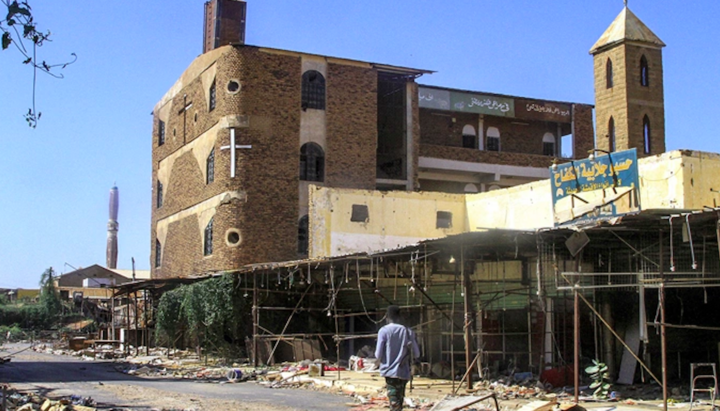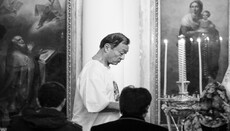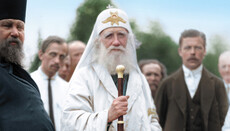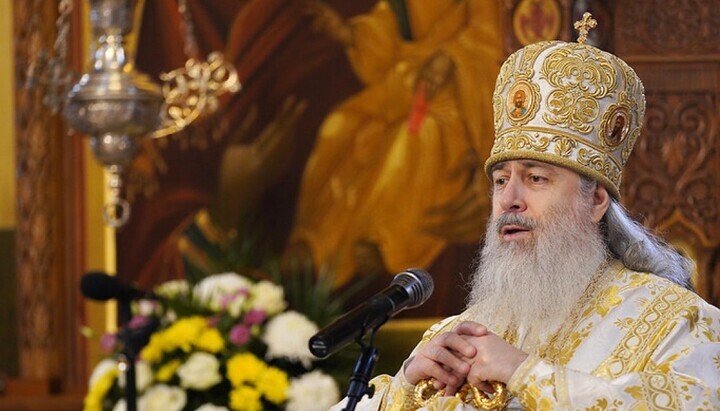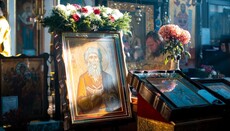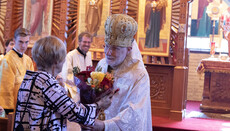Met. Saba: 'We Do Not Fear Martyrdom'
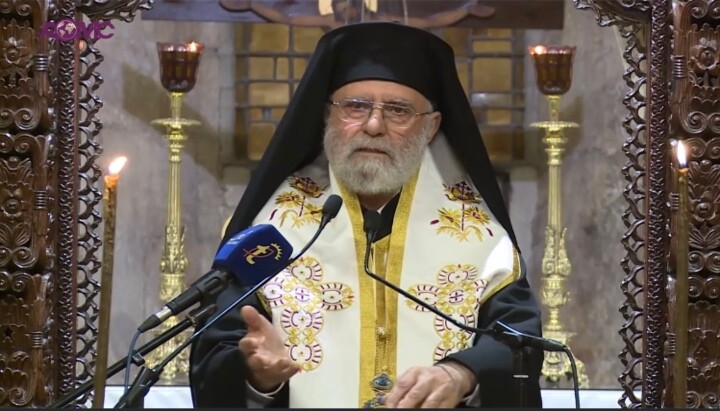
In a homily following Trisagion prayers for the New Martyrs of Damascus, His Eminence Metropolitan Saba of the Antiochian Archdiocese of North America speaks about martyrdom.
LEBANON — With the blessing of Patriarch John X, the Patriarchal Monastery of Our Lady of Balamand in Lebanon held a Paraklesis service and Trisagion prayers for the martyrs of the recent St. Elias Church attack in Damascus.
Their Eminences Metropolitan Saba and Metropolitan Antonios participated, along with Maronite Bishop Youssef Soueif as a representative of Patriarch Bechara Al-Rahi.
Metropolitan Saba, who is currently on pilgrimage with Antiochian seminarians and clergy from the U.S., delivered a homily on martyrdom and offered condolences to the bereaved. The attack took place in the Archdiocese that His Eminence served before being elected to lead the flock of North America.
The service was attended by clergy, seminarians, officials, and a large crowd of faithful. Metropolitan Saba’s full homily is published below.
My brother in Christ, Your Eminence Antonios, shepherd of the God-protected Archdiocese of Zahle, my brother Bishop Youssef, Maronite Bishop of Tripoli, representing His Beatitude Patriarch Bechara Al-Rai, Honored dignitaries from the civic and political spheres, beloved clergy and faithful brethren,
It is not easy for someone who has served as a bishop for nearly a quarter of a century to speak about the martyrdom and witness of his children. Most of those who were martyred in St. Elias Church last Sunday were people I had served spiritually in the Archdiocese of Hauran. Despite human pain shared by all of us over what happened, we are proud, because we have gained twenty-five new saints.
We Christians are a people who love life, for it is a gift from God. We hate death because it is the result of sin and separation from God. Therefore, we do not accept killing. Our Lord Jesus Christ said in His Gospel: “I came that they may have life and have it abundantly” (John 10:10) or in some accurate translations, “that they may have the life to the fullest.”
Thus, we are a people of life, and we know well that life is only fulfilled in the presence of our Lord Jesus Christ and the Holy Spirit.
Shall we say we have grown familiar with martyrdom? Yes, it is a blessing to become a martyr, but we do not seek it of our own accord. If it comes, we receive it with strength and courage, armed with the word of the Gospel. The Lord spoke thus: When they bring you before governors and councils – meaning when they persecute you – do not worry or be afraid or think about what you will say, for you will be given what to say (see Matthew 10:17-20).
This means, dear friends, that we do not fear death, because we are children of life. We believe firmly that the life given to us is completed in the eternal life that begins after this earthly one, in the light of God that never fades. In death, we pass into life.
Our Lord also told us that the time will come when those who kill you will think they are offering a sacrifice to God (John 16:2). From the beginning of Christianity, there have been persecutions. We do not wish that any of our fellow citizens stand before God accused of murder, but if God wills that we are martyred, we are ready. We do not fear martyrdom.
Last Sunday, three heroic men threw themselves onto the suicide bomber to lessen the impact of the explosion. Many died and many were injured. But had these three not thrown themselves on him, far more people would have been killed and wounded. They did not fear death, but offered themselves as a sacrifice, just as our Lord Jesus Christ did.
These three young men were all from the same family, from a village renowned for preserving its Christian faith. In that village, in 2014, two boys, no older than 14 or 15, were kidnapped. After mediation, we were able to bring them back the next day. One of them told me they were severely tortured and burned with cigarettes to make them renounce Christ. He showed me his back, completely burned. They were trembling with fear, but they still refused. Children, by the United Nations’ definition.
Finally, they were placed in a wooden box resembling a coffin, with a large knife placed at their necks, and were threatened with slaughter if they did not deny Christ. One of the boys told me: “Sayidna, I don’t know where the strength came from. I forgot fear. I felt ready to face them alone. I told them forcefully: Even if you kill me, torture me, slaughter me, I will not deny Christ. I was born a Christian and I will die a Christian.”
I opened the Gospel according to Matthew, chapter 10, and read him the passage I shared with you earlier. He began to cry. He hadn’t known those verses, and said: “That’s exactly what happened to me.”
This is only one of countless testimonies of martyrs for the past 2,000 years, across the globe. That is why we do not fear. We do not choose martyrdom or go after it, but if it comes, we are not afraid. We believe that the Lord will be with us in that hour and will strengthen us.
What happened is to be utterly condemned and rejected. Yet, together with our father, His Beatitude the Patriarch, who – despite his health condition – went personally to comfort and visit his children and stand beside them in this great trial, we ask and pray that God comforts, strengthens, and supports all the families of the martyrs.
We heard comforting and uplifting words from some of them, words that bring joy to the heart, despite the great suffering. We also pray for those still in hospitals, for their full recovery. May they return to normal life and witness to their faith.
We also pray for our Father, His Beatitude Patriarch John, with whom we stand firmly and resolutely. We, as bishops, clergy, and people, are all by his side in all his acts by which he serves his flock first, and his countries – Syria, Lebanon, and the wider Antiochian region – second.
We are proud to have a Patriarch ready to speak the word of truth at all times, without fear and with great love.
If God calls us, dear ones, to be among His martyrs, we hope to be able to say to Him: We are ready. The martyr is a saint in our Church, especially since he or she dies for Christ and does not deny Him. The Church is not required to conduct studies or prepare lists and procedures to declare the sainthood of martyrs.
We have lost many of our children in this century, but we have gained many saints.
Today we prayed for the repose of their souls, though we are fully confident that we should instead pray to them, asking them to intercede for us, for they are now in the unending light of God.
This is our hope, our faith, our testimony.
May the Lord always grant us to keep this trust with the utmost care, purity, joy, and courage. Amen.




